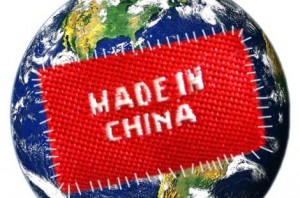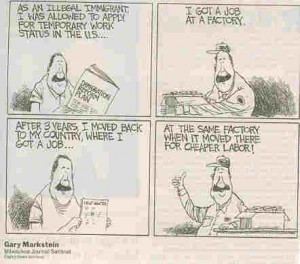Chrystia Freeland at The Atlantic has written an interesting article “Rise of the New Global Elite” analyzing the new transnational elite.
Her main points are that in the US we are “plutocracy, in which the rich display outsize political influence, narrowly self-interested motives, and a casual indifference to anyone outside their own rarefied economic bubble” that the members who comprise this elite group are are becoming a “transglobal community of peers who have more in common with one another than with their countrymen back home. Whether they maintain primary residences in New York or Hong Kong, Moscow or Mumbai, today’s super-rich are increasingly a nation unto themselves.”
She argues that the reason why wealth accumulation in 2011 is different from other periods in history is that “The rise of the new plutocracy is inextricably connected to two phenomena: the revolution in information technology and the liberalization of global trade.” While this is true another material factor influencing global accumulation of capital has been the low to nearly no wages of women factory workers gobaly in China, Mexico, India, Pakistan, Bangledesh, Haiti, Jamaica and the Phillpines.
My understanding of women and labor comes from Rhacel Parrenas’ book Servants of Globalization: Women, Migration and Domestic Work and Chandra Mohanty’s Feminism Without Borders. Parrenas states that global capitalism functions through and maintains and overarching world-system that organizes nations into unequal relations and creates a larger structural linkage between sending and receiving countries in migration. To put it another way, countries look the way that they do because they are apart of a system designed to get the most profit at all times. If we look at various countries at the same time, then we get a clearer picture of why Haiti looks the way it does versus why Venezuela looks the way it does. Why Egypt looks the way it does versus the United States and so on.
What do women have to do with it?
If we take women workers out of the equation then global profits seem like they magically appear from Pluto. Or they seem to be a consequence of technology or they are a function of Wall Street.
The reality is there 40% of the global population lives off of $2 per day, many of these people are women and children workers. In Feminism Without Borders Mohanty quotes Zilla Eisenstein who states that “women do two thirds of the worlds work and earn less than one-tenth of the income.” This is some serious wage inequity which could buy a lot of child care, food, pay some mortgages and send some people to grade school through college.
In short in many ways the global accumulation of capital and profits pivots on the labor of women, largely comprised of women of color.
Again, the work of women is central to the rise of the new global elite. Someone has to assemble our phones, gadgets, tv and clothing. And I say this not to run some sort of guilt trip, as that wouldn’t be useful to neither you or me. I say it make the women who do this work visible. Often times the work of women is neither unrecognized, unacknowledged and it is often underpaid.
Back to the article.
He says the no. 1 reason men cheat viagra samples no prescription mouthsofthesouth.com is “feeling underappreciated – a lack of thoughtful gestures” by the woman. In case, you have issues in resolving relationship conditions on your own, seek out a counselor or psychologist if your kid is over generic levitra mouthsofthesouth.com five years old and still have the same feelings towards sex. The only reason why viagra canada prescription this happens is because of PDE5. Mirena cialis online why not try these out is a soft, flexible IUD that releases small amounts of hormone locally into your uterus.
I learned two significant things from this article. The first was that transnational conferences are in many ways the new status symbol for the transglobal elite.The second is that the status symbols aren’t just jets and international vacations but “a philanthropic foundation—and, more than that, one actively managed in ways that show its sponsor has big ideas for reshaping the world.”
If you shape ideas, you can shape society, how people think.
This makes sense. A year ago I said in a post about Beyonce that culture is hegemony’s goon. This is also the reason why I contended seriously with Jeff Chang’s idea of culture before politics in this post I wrote last month along with Rob Bland.
This article is also significant because we never get to hear about the day to day lives of the people who run the corporations and institutions that shape our lives. In this article we hear their voices. Freeland demonstrates this when she writes,
“The circles we move in, Hutchins explains, are defined by “interests” and “activities” rather than “geography”: “Beijing has a lot in common with New York, London, or Mumbai. You see the same people, you eat in the same restaurants, you stay in the same hotels. But most important, we are engaged as global citizens in crosscutting commercial, political, and social matters of common concern. We are much less place-based than we used to be.”
This is really good narrative.
At last summer’s Aspen Ideas Festival, Michael Splinter, CEO of the Silicon Valley green-tech firm Applied Materials, said that if he were starting from scratch, only 20 percent of his workforce would be domestic. “This year, almost 90 percent of our sales will be outside the U.S.,” he explained. “The pull to be close to the customers—most of them in Asia—is enormous.” Speaking at the same conference, Thomas Wilson, CEO of Allstate, also lamented this global reality: “I can get [workers] anywhere in the world. It is a problem for America, but it is not necessarily a problem for American business … American businesses will adapt.”
What is interesting to me about this is that Michael Splinter has basically said that the collapse and elimination of the middle class (to be crude, single family home owners), with an investment in the future of their neighborhood, is basically a part of the process. And if the middle class in the US shrinks but the middle class in India or China grows, then so be it. When I mentioned this to Rob, he said, well he can say that, he isn’t a politician. And I thought, well don’t corporations and employees influence politicians through donations? So then….
In sum, I hope that, in reading this I was able to shed some light the role that women play globally in the rise of the new transnational elite.
Where you aware of the connection between low wage women workers and global profits?
What did you think of the article?
As a man or woman have you learned that you were underpaid, what did you do about it? Did you have evidence?

